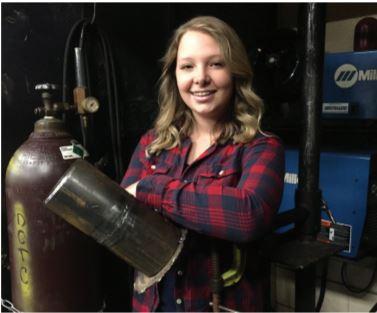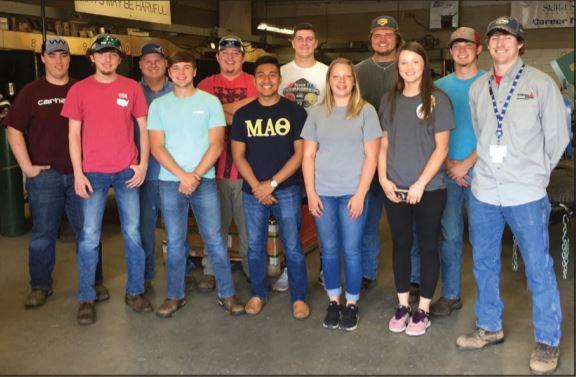CTE Dual Enrollment That Works
“Some of our students have never set foot on a college campus,” says Jonathan Phillips, director of the DeKalb County Technology Center in Rainsville, Alabama.
That’s a point of pride at DCTC. Although the center is known for providing quality career and technical education courses and industry credentials, it also offers academic courses that satisfy graduation requirements and dual enrollment courses that put students on the fast track to credential and degree attainment.
DCTC students who meet state eligibility requirements for dual enrollment, including a 2.5 GPA, can earn up to 30 college credits during their junior and senior years. Dual enrollment credits count toward graduation and a college certificate, credential or degree at an Alabama college or university.
FLEXIBLE SCHEDULING
DCTC students typically take regular high school courses during the day and dual enrollment courses in the evening on Monday, Tuesday or Thursday at the center. Students can also take courses on the campus of Northeast Alabama Community College, located just three miles away. Select courses are offered in the summer at DCTC and on the college campus.
 “It’s all about geography and what works
best for students,” says Russell McFall, DCTC’s welding
instructor. McFall’s status as an adjunct faculty member at
Northeast Alabama Community College ensures that the dual
enrollment courses he teaches meet accreditation and
certification guidelines no matter where they’re taught.
“It’s all about geography and what works
best for students,” says Russell McFall, DCTC’s welding
instructor. McFall’s status as an adjunct faculty member at
Northeast Alabama Community College ensures that the dual
enrollment courses he teaches meet accreditation and
certification guidelines no matter where they’re taught.
Course schedules meet students’ needs. In DCTC’s welding program, for example, students take dual enrollment courses one night each week at the center. “Because many of our students have to work, it helps to offer dual enrollment courses for six hours one night each week,” says Phillips. “That schedule also allows instructors to spend more intensive one-on-one time with students.”
LOW OR NO COST
Dual enrollment usually costs students nothing. That’s because state workforce development funds, supported by industry, provide over $11 million each year in scholarship support for CTE dual enrollment in high-demand career fields. As Joshua Laney, senior director for workforce development at the Alabama State Department of Education, explains, dollars first go to the Alabama Community College System. Individual colleges then call on the System office to support student enrollment in dual enrollment. Colleges can also apply CTE dual enrollment scholarship funds toward textbooks, tools and supplies.
DUAL ENROLLMENT = CAREER AND COLLEGE SUCCESS
All of DCTC’s dually enrolled welding students in the class of 2018 earned a postsecondary short-term certificate and enough college credits to complete an associate degree within a semester or two after graduation.
“Many of our students choose that short-term certificate so they can put it to work right away,” says Phillips. “We’re now doing more advising focused on helping students get those associate degrees before they graduate.”
DeKalb County Technology Center students are also earning valuable industry-recognized credentials. All welding students are expected to earn the National Center for Construction Education & Research Core, an Occupational Safety and Health Administration 10-hour completion card and a range of American Welding Society certifications — the same credentials held by adults in the workforce.
The Center’s welding students are shattering state records for certifications. Every welding student in the 2018 senior class — McFall’s first graduating class as an instructor — earned the NCCER Core. What’s more, the number of students who earned a welding certification rose from four in 2017 to 34 in 2018. Overall, in 2018, DCTC’s welding students earned:
- 22 open root pipe certifications — a record for Alabama high school welding programs.
- 15 6G open root pipe certifications — the state’s previous record for a high school welding program was seven 6G open root pipe certifications in one year.
ONE STUDENT’S SUCCESS
Before she graduated in 2018, Anna Daniels, pictured at right, participated in dual enrollment and was an active SkillsUSA member.
In the fall of 2017, McFall observed Daniels performing her first gas tungsten arc weld on a round pipe in the 2G position. As he relates, this is a particularly challenging weld to achieve due to the pipe’s changing angle. Once Daniels finished the weld root and capped the pipe, McFall was so impressed with her nearly flawless results that he decided to mail the pipe to be X-rayed at a testing lab in Bessemer.
“I did some research and found that Anna is the first young woman in the state of Alabama to pass a 100 percent X-ray tested pipe certification at the high school level,” says McFall.
In March 2018, Daniels won a Go Build Alabama Student of the Month scholarship award of $1,000 that she can use to continue her education at an Alabama postsecondary institution. Go Build Alabama, an initiative of the Alabama Construction Recruitment Institute, educates young people about training and career opportunities in the construction industry.
MORE ACCOLADES
DeKalb County Technology Center was awarded a 2018 Gene Bottoms Pacesetter School award from SREB in recognition of its outstanding efforts to collaborate with business, community and postsecondary partners to educate students and parents about careers.
Contacts: Jonathan Phillips; Russell McFall; Joshua Laney


